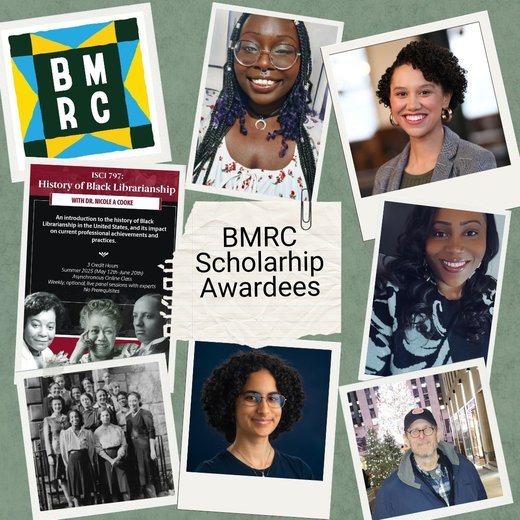The BMRC implemented a layer of protection against disruptive bot traffic. Learn more.
Awardees of BMRC Scholarship for History of Black Librarianship Course Announced
May 5, 2025

The Black Metropolis Research Consortium is excited to announce the awardees of scholarships to enroll in the History of Black Librarianship course offered by Dr. Nicole Cooke at the University of South Carolina.
The course "delves into the historical milestones, systemic challenges, and the vital role Black librarians play in shaping access to knowledge." Due to the demand and the compelling moment we are in, the BMRC awarded six scholarships instead of the originally planned three scholarships.
Each awardee has a reason for wanting to take the course. Dominique Dozier, a Student Success Librarian at Santa Clara University, says that she is taking this course because it feels important to her growth as a Black librarian. She wants “to learn more about the history of Black librarianship, the barriers we face, and ways to advocate for real change.”
Shandy Walton Burns, a student at the School of Library and Information Science at Simmons University say that she looks forward to the History of Black Librarianship course, “because the history of African/ African American librarianship and scholarship has been ignored in the curriculum at Simmons University. Just as the complicit relationship between libraries and systemic injustice is intrinsically tied across racial and poverty lines in America, the influence of Black librarians and intellectuals have created spaces for creativity, inclusivity and social freedom for Black people.” Shandy wants "to become a more resourceful, aware and skilled intellectual, publicly.” She also thinks this experience “will impart greater self-esteem, new research strategies and enrichment for all the participants.”
Deirdre J. Amukowa, a graduate student pursuing her master's degree in librarianship at the Graduate School of Library & Information Studies at Queens College. Taking the History of Black Librarianship course is important to her because she hopes “to gain the tools to actively resist systemic bias in information spaces.” She also hopes to deepen her understanding of how to serve, uplift, and represent the voices of Black youth, “while also learning of my predecessors and their accomplishments in our communities in a profession that is often viewed as a “white.”
Shira Greer, a 2025 graduate from the School of Information and Library Science at the University of North Caroline at Chapel Hill, says that as an emerging professional, she wants “to have a better understanding of the Black librarians who came before me to be able to critically analyze how I can build upon their work as I embark on my own journey as a Black librarian.” She also looks forward to “forming a community of practice with other LIS workers, researchers, and lifelong learners who are dedicated to engaging and honoring the history of Black librarianship."
Francis Stanley, who holds an MLIS, has been a public-school educator for nearly twenty years who hopes to be accepted into a doctoral program in Information Science. Francis was intrigued by the Black Librarianship course for many reasons, Among them is his belief that he “benefits from any shifting of experiential perspective.” The more he learns about other available perspectives as they relate to marginalized people and communities, the better he may serve those very people and communities. He says that “today's current political climate begs for a course such as Black Librarianship to consider and provide further understanding of a still marginalized portion of American society, which likely has different information needs and desires.”
Inbar Michael, a Research and Instruction Librarian says taking the History of Black Librarianship course is important to to her because it will enhance her contextual knowledge as it pertains to research regarding the segregation of libraries in the Jim Crow South. She hopes to teach a class on this research someday, as she believes there is an information gap when it comes to providing an inclusive look into the history of libraries. Additionally, as a recently graduated BIPOC library student, she feels that that " library school does not adequately delve into the history of libraries, especially as it pertains to Black librarians and other IPOC, and the impact and legacy they have left, as well as the racism and systemic challenges they have faced and continue to face."
We are excited for the learning journeys of our awardees and for the contributions that they will make beyond the classroom. Look for social media posts from them as they document and share their learning experiences.